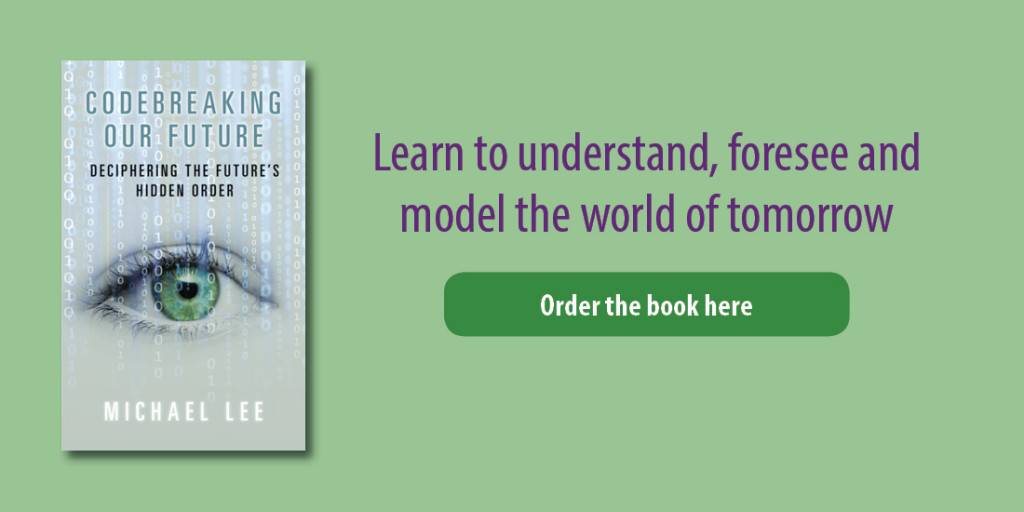RoboFuture? Ten questions about machine intelligence
11 July 2014 by Infinite Ideas in Business and finance, Codebreaking our future
by Michael Lee, author of Codebreaking our future
[Originally published as a blog on the World Future Society website]
Ever since HG Wells wrote The War of the Worlds in 1897, various works of science fiction have speculated about the take-over of humanity by advanced robots or machines. Inventor and futurist Ray Kurzweil has gone several steps ahead of science fiction by working out an elaborate philosophy and pathway to a future governed by machine intelligence.
Kurzweil postulates that the Singularity will happen in 2045 when “the pace of technological change will be so rapid, its impact so deep, that human life will be irreversibly transformed” [Kurzweil, R (2005): 7]. It will represent, he claims, the “culmination of the merger of our biological thinking and existence with our technology…There will be no distinction, post-Singularity, between human and machine or between physical and virtual reality.” [Kurzweil, R (2005): 9] The non-biological intelligence created in the year of the Singularity, he states, will be one billion times more powerful than all human intelligence today [Kurzweil, R (2005): 136].
For computer scientist and science fiction author, Vernor Vinge, the core of the Singularity would be “the creation of greater-than-human intelligence” [More, M. & Vita-More, N (2013): 366] at which point all human rules will be thrown away in the face of an “exponential runaway beyond any hope of control” [More, M. & Vita-More, N (2013): 366]. After Singularity, Vinge and Kurzweil both proclaim, we’ll wake up in a radically new Post-human era.
I have several philosophical, logical, ethical, historical and futurological problems with the concept of the Singularity (which I will explore in future blogs) but today I simply want to adopt a common-sense approach. I want to ask 10 questions about machine intelligence. Readers can then answer each one as they see fit. The idea is to highlight the nature of machine intelligence compared to human consciousness.
While information technology has already attained unbelievable and revolutionary utility in today’s world, human intelligence, in my view, is far superior in virtually every facet to the intelligence within computer systems except for the processing, aggregating, calculating, storing and distribution of data at blindingly fast speeds. There have been several decades of worldwide research and development in the field of computers and so it is fair game to dig deep, at this juncture, as to the kind of intelligence which has actually been produced by computers in practice.
Here they are, then, ten questions to ask any man-made machine:
- Has machine intelligence ever independently produced an original idea, theory, philosophy or discovered any new principle or law of existence? This question concerns the capacity for sustained, original, creative thought.
- Has machine intelligence ever produced a unique, non-programmed story or created any imaginative literary work? This question relates to the power of imagination.
- Has a computer ever spontaneously said “I love you” and meant it? Q3 is about personal, real-time communication.
- Has a computer ever said “I’m sorry” and meant it? This question relates to empathy, the skills of listening and emotional intelligence in general.
- Has machine intelligence ever invented or coined a new word or term? Q5 concerns original linguistic talent.
- Has machine intelligence ever made an independent, non-programmed decision about how to act based on conscience? This question is about ethics and a sense of justice.
- Has a machine ever come up with a solution to a tricky social problem, solved a crime or adjudicated in a complex legal dispute? Q7 relates to the powers of deductive reasoning and lateral thinking.
- Has technology itself ever invented new technology, that is, have machines ever produced new types of machine no human had previously thought of? This question touches on the ability to be truly inventive.
- Has a machine ever had a religious or spiritual experience, an epiphany or eureka moment, said a non-programmed prayer, exercised faith or known awe and wonder? Q9 is about human spirituality.
- Has a machine ever made a spontaneously, personally motivated, non-programmed exchange with another being, whether some form of trade or extended social interaction? This question relates to the ability to engage in complex social, economic and political activity as a social being.
Aside from investigating the many technical and philosophical questions relating to the evolving interface between human and machine intelligence, these ten common-sense questions show it would be well-nigh impossible to mimic human consciousness and intelligence, let alone recreate, upload and surpass it, as proposed by Kurzweil.
Besides, do we really want to hand over control of civilization and human destiny to machinery?
Don’t we want to use, rather than become, technology?
Note: please feel free to send answers to any of these “ten questions to ask machines” to michael@futurology.co.za.
Acknowledgments
Kurzweil, R. 2005. The Singularity is Near – when humans transcend biology. London:Duckworth.
More, M. & Vita-More, N, ed. 2013. The Transhumanist Reader. Chichester: Wiley-Blackwell.

